Peter MALONE
Saturday, 18 September 2021 19:59
Ping Pong
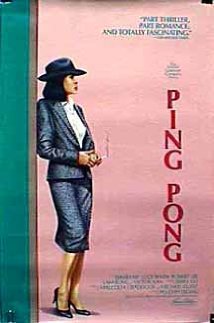
PING PONG
UK, 1987, 100 minutes, Colour.
David Yip, Lucy Sheen, Robert Lee.
Directed Po- Chih Leong.
An English film made by Chinese about the Chinese community in London. The director himself, of Chinese origin, was actually born in the UK in 1939.
The film portrays a family, their becoming English, the conflicts with cultural origins. There is some similarity with Soursweet which covered some of the same material with a thriller setting.
The patriarch dies and a young solicitor, Chinese but British, but speaking no Chinese, is asked to administer the will, interacts with the family and friends.
There is a lot of humour, some excellently drawn characters and a nice twist at the end. In fact, this is a pleasing and sympathetic look at cross cultural experience.
1. The title? A game? Chinese background?
2. The director, Chinese, British background?
3. London, Chinatown, the Chinese enclave, restaurants, family life? The lawyer, entering into this world? The flavour of China, London, culture, identity?
4. The locations, the feel of Chinatown? The musical score?
5. The restaurant, everybody involved, the clientele, locals, Chinese, tourists? Sam Wong, his death, the phone booth? The consequences of his death, the will?
6. The invitation to Elaine, the favour to the family, her skill with the law, the touch of the warrior, the nature of the will, probate, her investigations?
7. The various members of the family, Sam’s wife, daughter, son-in-law, the two sons, the cook – and the variety of characters, the beneficiaries, the conditions? Sam and his work, the restaurant, the will and disagreements?
8. Mike’s son, working with Elaine, his character? The research into the family, into the beneficiaries, various secrets, the difference between the generations, Chinese life?
9. The old man, illegally in Britain, over the roofs, the conditions for his benefits?
10. The gradual exploration of the families, the personalities – and the twists?
11. The Chinese in the United Kingdom, their culture, cultural identity, the mix of China and Britain?
12. Interesting family stories – with more than a touch of humour? Secrets and result resolving issues?
Published in Movie Reviews
Published in
Movie Reviews
Tagged under
Saturday, 18 September 2021 19:59
Story of Boys and Girls, The/ Storia di Ragazzi e Ragazze
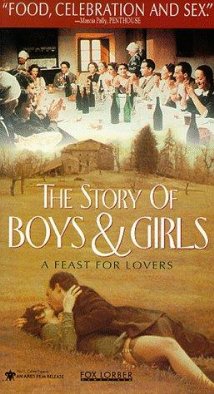
THE STORY OF BOYS AND GIRLS/ STORIA DI RAGAZZI E RAGAZZE
Italy, 1989, 87 minutes, Colour.
Lucrezia Lante della Rovere, Davide, Bechini.
Directed by Pupi Avati.
An Italian memoir, set in the mid-1930s near Bologna, two families (and the class distinctions) as they join for an engagement dinner (20 courses served by the country family to the bemused city family). In black and white, it is like photos of the period come to life, reminding us of how human nature remains the same, strengths and weaknesses, love and hurt. the characters are mostly eccentric (aren’t we all?) In the film will appeal to lovers of Italian Cinema.
1. An entertaining Italian film? The work of the director, his perspectives on Italian life? Humane?
2. An Italian story, characters – but universal characters and appeal?
3. The country estate, the home, the grounds, the banquet? The contrast with Bologna, the city? The contrast between city and country?
4. The large range of characters, editing, pace, the strength of the dialogue? The musical score?
5. The black-and-white photography, like photos from the 1930s, bringing this period to life in a stylised way?
6. Engagement party, the 20 courses, the preparation, the many cooks, the serving, the guests, interactions?
7. Sylvia, in herself, age, experience, the background of her family, her love for Angelo?
8. Angelo’s mother, in Bologna, looking down on Sylvia’s family and class, the more benign approach of Angelo’s sisters? The shared views?
9. The train trip, the married sister, the discussions, anticipation?
10. The range of guests, the family, the older salesman, the Frenchwoman accompanying him…?
11. The dinner, the courses, interactions, discussions, the nature of fidelity, love and affection, class distinctions, the revelation of secrets?
12. The end of the day, people the same, but some imperceptible changes?
Published in Movie Reviews
Published in
Movie Reviews
Tagged under
Saturday, 18 September 2021 19:59
Teenage Mutant Ninja Turtles 2
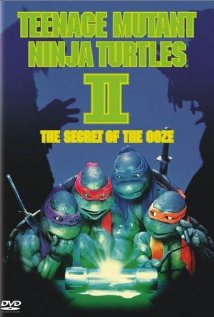
TEENAGE MUTANT NINJA TURTLES 2
US, 1991, 88 minutes, Colour.
Paige Turco, David Warner, Michelan Sisti, Leif Tilden, Kenn Scott, Mark Caso, Kevin Clash, Ernie Reyes Jr, François Chau.
Directed by Michael Pressman.
Fairly easy to review: much the same as last time.
The plot has environmental overtones, cover-ups in New York about the disposal of nuclear waste (which, of course, made the turtles who they are). Shredder and his gang are back as are the helpless police. but so is wise old Splinter and David Warner as a scientist. It’s all Saturday matinee action which no one should take too seriously and so an enjoyable sequel.
1. The popularity of the Turtles? The initial film? Television programs?
2. New York City, the world of the Turtles, nuclear waste and disposal, the hostile gangs, Shredder and his associates, newspapers, reports, martial arts battles? Musical score?
3. The Turtles, the four, their appearance, their personalities, the voices? The interactions? On the side of good? The relationship with April, her work as a journalist, making reports, investigations?
4. Shredder, thought to be dead, rising to new life, bigger, his associates, his plan defying the ooze, to use it to create his own gang? His manipulations, creations, taking the Professor, getting his help? The confrontation with the Turtles, the battles, defeat?
5. Splinter, his character, old, wise, giving advice?
6. The nature of the ooze, the Turtles’ attitudes, the dangers?
7. The pizza boy, the importance of pizza, his being bullied, his martial arts, working with the Turtles, the fights?
8. Saturday matinee ingredients, characters, situations, the imagination, dangers, fights?
Published in Movie Reviews
Published in
Movie Reviews
Tagged under
Saturday, 18 September 2021 19:59
Diamond Skulls/ Dark Obsession
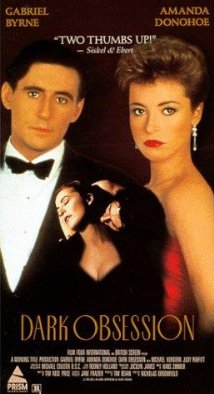
DIAMONDS SKULLS/DARK OBSESSION
UK, 1989, 100 minutes, Colour.
Gabriel Byrne, Amanda Donohoe, Struan Rodger, Douglas Hodge, Michael Hordern, Ian Carmichael, Judy Parfitt,, Sadie Frost.
Directed by Nick Broomfield.
A British crime thriller that is more of a searing attack on the aristocracy and class distinctions than thriller. The focus is on the cover-up of a hit run accident where the reputation of Lord Hugo, the driver, is of more importance than all else. He is an obsessively jealous husband, with a protective mother and manipulating broker boss.
Gabriel Byrne is effective as the more and more unlikeable hero Hugo. Amanda Donohoe elicits some sympathy as his wife. The rest of the upper crust… Who could like them.
Studied drama of corrupt Britons by documentary maker Nick Broomfield.
1. The title? The attitude towards wealth, death? The alternate title, The dark obsession?
2. The British settings, characters, homes, wealth, business, police investigations? The musical score?
3. The work of the director, a fiction, and his career interest in documentaries?
4. The character of Hugo, his status, the influence of his parents, the domination of his mother, the aristocratic background, his business interests, his partner, belonging to the regiment, his friends?
5. The marriage to Ginny, their son, the tensions in the marriage, his jealousy, his wild imagination about Ginny and infidelity? His spying on her?
6. The night drinking, the regiment friends, his running over the woman, her death – and his imagining her resemblance to Ginny? The consequences?
7. The responses, Hugo and his behaviour, the friends urging him to drive on? Peter, partner, mixed motivations, power, the estate? The contrast with Jamie, with Hugo’s sister, wanting to go to the police?
8. The decision, driving on, the police investigation, the members of the family, the decisions, saving the family’s reputation?
9. Jamie, wanting to go to the police, Peter and Hugo making him the victim, killing him, as if suicide, and as if responsible for the accident?
10. Hugo, going free – and his future?
11. The perceptions of the wealthy class in the UK, satirical aspects, cynical aspects?
Published in Movie Reviews
Published in
Movie Reviews
Tagged under
Saturday, 18 September 2021 19:59
Bedevil
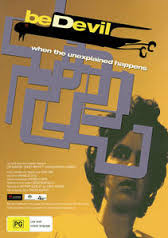
BEDEVIL
Australia, in 1992, 1993, Colour.
Tracey Moffat, Lex Marinos, Ricardo Natoli, Dina Panozzo, Les Foxcroft, Auriel Andrews, Debai Baira, Banula, Jack Charles, Diana Davidson, Pinau Ghee, Patricia Handy.
Directed by Tracey Moffat.
Three very stylised short ghost stories, modelled on Asian film conventions which may bewilder or bedevil those who like them are movies to be straightforward.
Information, incidence in characters are presented publicly.technically, the film is quite arresting, practically all studio-bound to suggest heightened reality/fantasy.
It is a first feature by award-winning aboriginal writer-director, artist Tracey Moffat. She also acts in the second story. an original contribution to Australian cinema.
1. The title, spirits, good and evil? Horror stories in the Australian context? Aboriginal context? What context?
2. Aboriginal stories, linked with white stories, aboriginal characters, moods? The work of the director, as an artist?
3. The visuals, the perspective of the artist, the use of colour, the landscapes, vivid, flashbacks and tones, exteriors and interiors? Special effects? The musical score?
4. The three stories, the cumulative effect, dreams? Conventional stories, differences? Aboriginal perspectives, white perspectives, the interconnection?
5. Mr Chuck: the locations on Bribie Island, the swamps, the homes, the perspective of the children, the flashbacks, the presentation of the ghost? The GI and his story, driving into the quicksand? The malevolent presence? The sense of the presence? The sense of evil? Old Rick, telling the stories, survival?
6. Choo Choo Choo Choo: the Queensland locations, the outback, the isolation? The house, Ruby, flashbacks to the older Ruby? The images of the ghost, the little girl and the tracks, ghostly images? The trains, the rails? The death of the girl, her gaunt presence? The haunting? Ruby going, the return, the contact with the ghost?
7. Lovin’ the Spin I’m In: the story of Imelda, from the Torres Street, her son Bebe, his marriage to Minnie? Leaving home, going to Queensland? Imelda following? The death of the two, the ghosts, uneasy, dancing in the condemned warehouse? The presence?
8. The full impact of experiencing these ghost stories and, especially, the aboriginal presentation?
Published in Movie Reviews
Published in
Movie Reviews
Tagged under
Saturday, 18 September 2021 19:59
Mc Farland USA
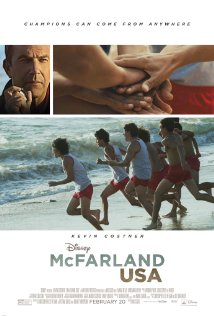
McFARLAND USA
US, 2015, 129 minutes, Colour.
Kevin Costner, Carlos Pratts, Ramiro Rodriguez, Maria Bello.
Directed by Niki Caro.
Mc Farland USA is one of those inspirational sports films, underdogs, a coach with energy, training, difficulties, and, finally winning. It is a Disney film.
However, even though it is somewhat formulaic, audiences have found it very entertaining and inspiring. One of the differences is that the sport is Cross Country running.
Kevin Costner plays Jim White, a coach with a short fuse who went to Mc Farland, California, in 1987, accepting a nothing job but seeing the children of Mexican immigrants running to the fields before and after school, and finding a notice about Cross Country, he decided to introduce this to the school, rounded up seven Hispanic students, including one with a weight problem who became the physical and moral anchor of the group. One of the boys, son of a picker of vegetables and armaments, is a potential champion.
This is a true story, the picture of the boys training, of the White family settling into Mc Farland, learning about the Hispanic customs, especially for the Quinceanera celebration for the 15-year-old daughter, sharing meals – and White going for a day’s work in the fields to experience what it was like for the boys.
They go in various competitions, learn a lot and are finally ready for a state championship which they win. Information at the final credits, along with pictures of White and the seven men almost 30 years later, show White had coached 11 wins over 15 years, that they all had good lives, even one with a prison term, and many of them committed to law enforcement and education at Mc Farland itself.
The film was directed by New Zealand director, Niki Caro, best known for The Whale Rider.
1. An entertaining sports story? Inspiration? Formula, differences?
2. The title, the California town, poverty, immigrants, hard work in the fields, vegetables and nuts? Mexicans, language, style of living, food…? Family customs and closeness?
3. Cross-country running, as a sport, its demands, difficult terrains, the training, exercise, skills, endurance and pain, determination?
4. The introduction, Jim White, Idaho, his work as a coach, the silent players, his injuring the player, history of short fuse? Moving, a poor job, driving, to California, his wife and the girls, the house, going out to eat, fearing the gangs?
5. Kevin Costner as Jim White? The symbolism of his name in this community? Strong character, his career, personality, relationship with his wife, children? The interview with the principle? His situation, coaching, meeting the kids, their lack of interest, sending them on collapse, the football game, the main coach, his stopping the boy going back on the field, the clash with a coach, the interview with the principal, the coach eating the apple?
6. The kids, from Mexican immigrants, their families, their names, language, both Spanish and English? At school, at work, the long hours, their life and prospects?
7. Jim White driving, Thomas and his running, locking him? Thomas and his suspicions? The confrontation? The idea for cross-country? The notice, the information, the discussion with the principal, the board, the grants? Gathering the kids, Daniel as his anchor? The recruitments?
8. Jim, his wife, their life, his daughters, forgetting his birthday the birthday cake? Tensions in the house? His discussions with the man at the shop, the Quinceanera, the preparations, the celebration, the speeches? Going to the drive, gangs, the bashings? Jim’s reaction, his daughter being safe, Thomas
saving her?
9. The students, the training, the first competition, coming forth? Learning? The poverty, the contrast with the upper-class teams, playing golf…? Learning, running over the hills of Armin’s, running to work and back, going further?
10. The families, the parents, work, the foreman, the pickers? The man at the store, discussions about the tree, his help with the celebration? The wife, the car, the needing to help, being fixed, the girl, the manicure for herself and daughters? Becoming friends? Jim and his going to the Dios family meal, the tacos, speaking in English and being understood? Preparing for the car wash, the food?
11. Jim, going to work in the field, the hard work, the effect on him?
12. The father, not wanting his sons to participate? Books not being practical? But the issue of college?
13. Competing with teams like Palo Alto, the improvement? More success? Daniel, food, the loss of weight, his participation? The effect on the others of being in the sport?
14. The State competition, everybody involved, the procession of cars, the bus? The hills? The race, waiting for the result, success?
15. The final credits, the subsequent careers of Jim White, with his wife, all the members of the team, their creditable jobs and contributions to Mc Farland?
Published in Movie Reviews
Published in
Movie Reviews
Tagged under
Saturday, 18 September 2021 19:59
Hardware
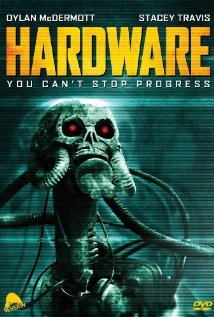
HARDWARE
UK, 1990, 94 minutes, Colour.
Dylan Mc Dermott, John Lynch, Stacy Travis, Carl Mc Coy, Iggy Pop, Mark Northover, William Hootkinis.
Directed by Richard Stanley.
This is a small budget science fiction feature that was unexpectedly very popular. Filmed in the video-clips style, with emphasis on the effects, music, cyber-punk, and the feel of the film rather than on plot and acting, it nevertheless has enough energy and uses the conventions of this kind of weapons-monsters-silent heroes and put-upon heroines, to prevent it being merely a young filmmaker’s self-indulgent movie or a corny variation on popular themes.
The South African director went on to make Devil Dust, was fired from the ill-fated The Island of Dr Moreau but continued to write and direct short films and documentaries.
1. The initial work of Richard Stanley? His background? Career? Young, working with a low-budget? Ideas, other science fiction, monster movies? Conventions of the genres? Cult film?
2. Post-apocalyptic world, nuclear disaster, radioactive earth, the sea gone, the desert? New York City? The apartments?
3. The musical score, the songs, cyber-punk? The many singers and musicians in the cast?
4. The visuals, the sets, costumes and decor, post-modern? The post-apocalyptic landscapes? The religious imagery, suggestions of crucifixion…?
5. Nomad, wandering the desert, his character, the discovery of the robotic head, his travelling to New York City, selling the head?
6. The nature of the robotic head, appearances, qualities, modern art? Its eruption? Its devastation? Cyborg activity? The military project, abandoned?
7. Moses, his character, in New York, his relationship with Jill, buying the head, giving it to Jill as a gift, her art work, the decision to use the head?
8. The range of supporting characters? Shades and his being wasted? Angry Bob, the DJ? Lincoln?
9. The head erupting as a monster, rebuilding itself, the amount of devastation, blood and gore, the range of its victims?
10. The rampage, Jill as the target, the destruction?
11. A cult film for enthusiasts of this kind of science fiction and fantasy?
Published in Movie Reviews
Published in
Movie Reviews
Tagged under
Saturday, 18 September 2021 19:59
Sisters/ 2015
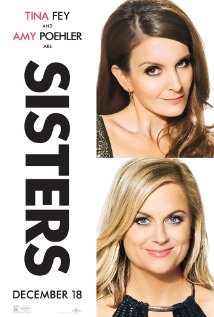
SISTERS
US, 2015, 118 minutes, Colour.
Amy Poehler, Tina Fey, Maya Rudolph, Ike Barinholtz, James Brolin, Dianne Wiest, John Cena, John Leguizamo, Bobby Moynihan, Greta Lee, Madison Davenport.
Directed by Jason Moore.
Amy Poehler and Tina Fey can be very funny, in sketches from Saturday Night Live, hosting award shows, playing off each other in comic sketches. They are both very funny here – at times. Again, they play off each other as two sisters, Tina Fey opting for raucous and broad humour, Amy Poehler, not necessarily avoiding the broad humour, but playing a character who has much more subtlety in her make up.
This is a comedy for those like to go out and let their hair down – as the two comedians are doing in their performances. It is raucous, often crass and crude, often unsubtle, with a house party that rivals the destructive mess in such films as Animal House.
The basic plot concerns their long-suffering parents, Dianne Wiest (who gets a chance to use some words that she never uses in other films) and James Brolin, who decide to sell their Florida house. Maura, Amy Poehler, is one of those people who has a great need to help others, offering advice to seeming beggars on the street (who aren’t), caring for her sisters daughter, a nurse by profession. Her parents tell her about the sale but cannot face up to telling her sister, Kate, Tina Fey.
The sisters decide to visit the parents with Kate discovering the plan and horrified. She is a manicurist, with an unguarded mouth, who loses her job. Her daughter, Hayley, Madison Davenport, is one of those sensible adolescents with a sense of responsibility which compels her to try to do her best for her mother and to control her. Kate has the bright idea that they could live in the family home until she gets another job. She pretends to get another job, Maua and her parents thinking she has one, and she continues to coast along, Hayley deciding that she cannot stay with her mother until she settles down.
This is the place where the sisters grew up, they have many friends, including loudmouthed Dave, John Leguizamo, who flirts, Alex, Bobby Moynihan, who is a nerd and tries to be a comedian at every opportunity, and Brinda, Maya Rudolph, once a friend but alienated by Kate when they were young but now bent on revenge.
Because the house is to be sold, the sisters decide to have a party, invite everyone, all hair down, no holds barred – and plenty of holds are unbarred during the party, Maura wanting to let her hair down and let go of her sense of responsibility and persuading Kate not to drink and to be the party house mother.
The party is raucous, very raucous, very loud, and goes on, and on, and on. The mess is quite devastating – and, of course, the parents turn up.
Maura has met a pleasant man, doing some building renovations, James, Ike Barinholtz, and invites him to the party, falls for him – until he experiences a fairly demeaning joke involving about arena toy and Beethoven’s Fur Elise. But, of course, he does help with the renovations and the cleanup. Maura is given various lectures that she does not have too absolutely help everyone. Kate make some resolutions, especially for the sake of Hayley.
And, as with all these raucous American comedies, everything ends up very properly and just so.
Published in Movie Reviews
Published in
Movie Reviews
Tagged under
Saturday, 18 September 2021 19:59
Call Me Crazy: a Five Film
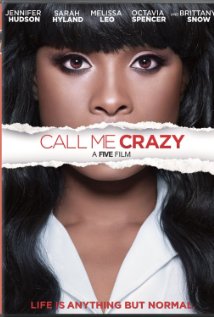
CALL ME CRAZY: A FIVE FILM
US, 2013, 85 minutes, Colour.
Jennifer Hudson, Sarah Hyland, Melissa Leo, Mitchell Rouse, Octavia Spencer, Sofia Vassilieva, Brittany Snow, Ernie Hudson, Jason Ritter, Jean Smart, Lea Thompson, Melanie Griffith.
Directed by Bryce Dulles Howard, Laura Dern, Sharon Maguire, Bonnie Hunt, Ashley Judd.
A previous Five Film had treated stories of breast cancer. This collection focuses on mental illness and it is very effective in bringing home to audiences five different stories, different mental illnesses including schizophrenia, bipolar, depression.
The stories are brief but very well told, well-written and effectively directed by five women, women who have achieved as actresses and now show their skills in direction.
Lucy, played by Brittany Snow, appears in the first film as a law student suffering from hallucinations and voices, going to a counsellor played by Octavia Spencer, going to group meetings where she meets Bruce, Jason Ritter, communicates with him despite her voices and he introduces her to the labyrinth, somewhere to walk with questions, hoping for answers.
Then Lucy appears in the third story, Alison, with Alison, Sofia Vessilieva, going home to introduce her boyfriend to her parents and upset when she hears that her sister is coming. The sister is Lucy. By this time she is a successful lawyer but Alison goes back over the past, Lucy’s attempt to strangle her sister, honest talking with each other, with Alison afraid for our own mental safety.
Lucy finally appears in the last story, about Maggie, Jennifer Hudson, who comes home after war action to attend the funeral of her superior officer – and in flashbacks it is shown how he has continually raped her and she is unwilling to go to the funeral, despite the encouragement of his widow, Melanie Griffith. Her father is played by Ernie Hudson. In her breakdown she has attacked her son and now Lucy is her lawyer encouraging her to face her future.
The second story is, perhaps, one of the most telling because of its drama. A young girl, Grace, Sarah Hayden, takes care of her bipolar mother, a tour-de-force performance from Oscar-winner Melissa Leo, extravagant in her behaviour at a supermarket, secluding herself in darkness at home, going on a frenzied shopping trip with Grace’s friends, driving recklessly, not taking her medication, going to a therapist – with a final collage of the different faces of her in her illness.
There is a male story, Eddie, Mitchell Rouse, a stand-up comic suffering from depression, unable to face reality and people, except his audience and his black jokes, cared for by his wife, Lea Thompson, who does not understand but makes an effort.
Very interesting in itself is a film – but, obviously, a powerful tool for education about mental illness.
1. The aim of the film? Audience awareness of mental illness? Empathy and understanding?
2. Mental illness, and illness not something personally chosen? Responsibility/not? The repercussions for the person, for the family, for the public, the groups, the therapy?
3. Five stories, Lucy and connections, the different writers, the five women directors and their profiles?
4. The effect of each short story, interest, emotion, observation, understanding? Interconnections?
5. The character of Lucy, studying law, her experiences, the hallucination in the library, voices, trapped, her collapse? The visit to the counsellor, the warmth of the counsellor, attentiveness, offering some hope? Encouraging her to study? Going to the group, the different attitudes, willing to participate or not, wry comments? Bruce, talking, the suicide attempt? Friendship, the meetings, the test and Lucy hearing the voices, her explanation? The labyrinth? Having questions and walking, searching for answers?
6. Alison’s story, young, taking Luke to meet her parents, as a couple, aged 19, the drive, going home, the mother and the joke about the first visit and no gift, her cooking, the room, the doors taken off, the talk about the sister? The father picking up the sister? It turning out to be Lucy? At the meal, the tensions, Luke asking awkward questions, the mother comfortable with the answers, the parents having coped, the experience of the years? Lucy and Alison, Alison’s harsh reaction, going upstairs, telling the story to Luke, the attempt at strangling, her fears, Lucy hearing everything? Lucy outside, the two sisters talking, Lucy as a role model for her younger sister, the love, Lucy always better – and even sicker? Alison’s fear for herself and mental illness?
7. Lucy and Maggie, Maggie and her military service, the post-traumatic stress, arriving home, the welcome from her father, the embrace of her son? The commander and his death in action? The funeral, her refusal to get out of the car, the dead man’s wife and her encouragement, Maggie’s collapse, attacking her son, his ringing 911? The treatment, Lucy and her visit, the talk, the flashbacks to the brutality of the rape? The issue of custody? Court and Lucy strong appeal to the judge? Bruce in court supporting her? Lucy bringing her son for a visit, the boy waving, her talking with her father, his apology, Lucy encouraging Maggie, and ending in hope?
8. The story of Grace, her mother, bipolar, Melissa Leo’s powerful performance, creating a character in such a short time, the audience mesmerised by her? Her behaviour in the supermarket, on a high, people watching, her daughter’s reaction? The contrast with lying in the dark, Grace opening the window, her wanting to stay in the dark? Grace and her love for her mother, fostering her mother, the absent father? And the situation, her friends, going for the drive, shopping for the clothes, her mother’s recklessness, the driving, the girl and her fear, the other girl offering support? The medication and the mother not taking her pills, dropping them on the floor, collecting them, going into the therapist? The collage of her face and the various stages?
9. Eddie, stand-up comedy, the audience, the jokes, outside and his depression, his wife, at home, her care, reaction and not understanding, trying to communicate? His sleeping all day? Her going out, the guests for the barbecue, his trying to cope, going inside? His wife going to the comedy routine, discussion with the audience, the audience reaction, his black jokes? Going to the therapist, the explanation, the hope?
10. The cumulative effect of these stories – under 90 minutes?
Published in Movie Reviews
Published in
Movie Reviews
Tagged under
Saturday, 18 September 2021 19:59
Dancin' Thru the Dark

DANCIN' THRU THE DARK
UK, 1990, 95 minutes, Colour.
Con O' Neill, Claire Hackett, Conrad Nelson.
Directed by Mike Okrent.
A touch of Liverpool. a touch of class barriers. Homeboy singer makes good and returns for a gig on the night his former girlfriend is having her hens’ night on the groom is out with the boys for his stag night. The boys are resentful of success, the girls over-protective.
Will she leave Liverpool? A touch of the fairytale in the drabness of Liverpool. Reminiscent of The Commitments with its local lingo, music, arguing and fighting, it is an interesting portrait of human nature.
The screenplay and the songs, the sharp and humorous dialogue, written by playwright, Willy Russell, author of Educating Rita and Shirley Valentine.
1. A piece of drama, with comic touches, from Liverpool?
2. The local impact, language, music, customs, familiarity? More universal appeal? Human nature?
3. Willy Russell, his plays, his songs and screenplay for this film? Sharp observation and dialogue?
4. The city of Liverpool, views, ordinary people, homes, clubs, factories, restaurants?
5. The songs, the performance, the score?
6. The situation, ordinary life in the factory, work? The dream wedding with the touch of the fairytale? Linda, her decision to marry, hopes for a change of life, Peter as her ex-boyfriend? Dave, her being engaged, loving him or not? Her girlfriends and their protectiveness?
7. Peter, going away, his success, return, performance, the relationship with Linda?
8. Dave, slow, going out with his mates, in the Indian restaurant, the warning about mixing the drinks, going to the club, his being sick in the toilet, his behaviour, his resentments?
9. Linda, growing up in Liverpool, dreams beyond Liverpool, marriage, the hens night, her friends, seeing Peter again, the comparison with Dave? Issues of commitment?
10. Eddie, with Dave, unstable, the reaction to Peter?
11. The drama, the conflict, the resolution – and what future beyond?
Published in Movie Reviews
Published in
Movie Reviews
Tagged under